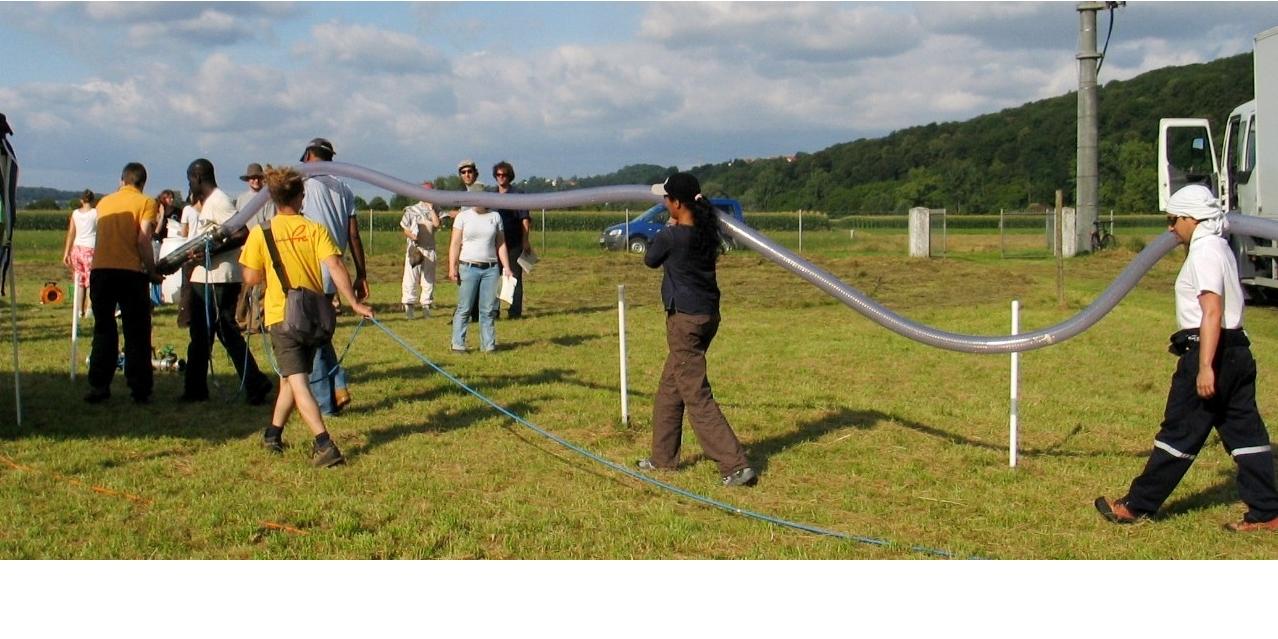Applied + Environmental Geoscience AEG - Master
Eckdaten zum Studiengang
Fakultät
Mathematisch-Naturwissenschaftliche Fakultät
Abschluss
Master
Zulassungsbeschränkung
Ja, im 1. Fachsemester
Regelstudienzeit
4 Semester
Kombinationsfach erforderlich?
Nein
Bewerbungsfrist
für
Deutsche, EU-Bürger/innen und Bildungsinländer/innen
Wintersemester:
15.07
Bewerbungsfrist
für
Nicht-EU-Bürger/innen
Wintersemester:
31.03
Gilt für alle Bewerber/innen mit deutscher oder EU-Hochschulzugangsberechtigung.
Studienbeginn
Wintersemester
Unterrichtssprache
Englisch
Finanzen
Beiträge und Gebühren
Voraussetzung und Bewerbung
-
Bachelor's degree (or equivalent) in Geosciences, Geoecology, Environmental Science, Geophysics, Mineralogy, Physical Geography, Soil Science, Mathematics, Physics, Chemistry, Biology, Computer Sciences, Civil Engineering or a field related to environmental sciences with an overall grade (CGPA) equivalent to or better than 2,5 German grading system
-
good background in mathematics, chemistry, physics and geosciences
-
English language proficiency equivalent to CEFR level B2 (e.g. TOEFL 79 iBT, IELTS 6.5)
For information on application prerequisites see the AEG website.
Each winter semester, 40 study places will be awarded in an internal university selection procedure. In the selection procedure, the overall grade of the Bachelor's degree is taken into account, as well as the personal motivation for the study program and relevant additional qualifications (e.g. study-related internships or professional training, voluntary services, etc.).
To apply for the AEG program please follow the online application procedure on the University's website.
English language proficiency equivalent to CEFR level B2 (e.g. TOEFL 79 iBT, IELTS 6.5, a degree with English as the medium of instruction)
Details zum Studiengang
"Applied & Environmental Geoscience" (AEG) is an international research-oriented study program focusing on the evaluation and solution of environmental problems. Special emphasis is given to environmental problems in the subsurface such as the pollution of drinking water supplies from groundwater resources, the non-sustainable use of natural resources, the impact of short and long term waste disposal, the impact of climate and land-use change on soil and water quality.
The program aims for a comprehensive understanding of the physical, chemical, and biological process mechanisms in the geo- and hydrosphere. Students from various science backgrounds learn to qualitatively and quantitatively address complex processes in soils, water and air and to evaluate environmental risks based on multi-disciplinary approaches.
By choosing the appropriate modules students can specialize in
- Hydrogeology
- Environmental Chemistry and Environmental Microbiology
- Environmental Physics
AEG stands for the following:
- a modern, interdisciplinary curriculum at one of the largest and renowned institutes of geosciences and environmental sciences
- a highly motivated staff and excellent study conditions in an international environment
- research and studies in working groups with many contacts to universities abroad
AEG is a 2-year program, beginning each winter semester. It consists of 5 compulsory modules (30 credits), 10 elective modules (60 credits) and a Master thesis (30 credits).
The first semester introduces to the necessary theoretical and quantitative aspects of environmental and applied geosciences. It includes three compulsary modules for all AEG students. The following semesters allow students an individual focus according to their field of specialization:
- Hydrogeology
- Environmental Chemistry and Environmental Microbiology
- Environmental Physics
Each specialization includes three mandatory modules. The remaining six modules can be chosen from a wide variety of classes taught in AEG and neighboring studying programs. In the compulsory modules "Scientific Practise" and "Scientific Presentation" students gain additional practical interdisciplinary skills, and benefit from close interaction with staff and research groups as well as an early start of the Master thesis in the third semester.
A study abroad period is not expected.
For an optional study abroad you find information here: Erasmus+ program in AEG
Freiwilliger Auslandsaufenthalt
In jedem Studiengang ist ein freiwilliger Auslandsaufenthalt möglich. Mit der Planung sollte ca. ein bis eineinhalb Jahre vor der Abreise begonnen werden.
Weitere Informationen und Beratung zum Auslandsstudium finden Sie auf der fachübergreifenden Seite Wege ins Ausland. Zudem bieten einige Fächer auch eigene Informationen zu Auslandsaufenthalten an.
The AEG Module Handbook describes the qualification goals and structure of the program, will help you to plan your studies and select the right modules, and specifies the study contents (type and scope of all modules, their courses, prerequisites and exams).
Entscheidungshilfe bei der Studienwahl
Entscheidungshilfen für ein Erststudium
Die Universität bietet Hilfen zur Entscheidungsfindung an. Dazu gehören z.B. der Besuch von Lehrveranstaltungen, Orientierungsveranstaltungen zu Studienwahlthemen sowie verschiedene Beratungsangebote. Weitere Hinweise finden Sie auf den Seiten für Studieninteressierte.
Entscheidungshilfen für Masterstudiengänge
Bei der Studienwahlentscheidung für die Masterstudiengänge spielen Spezialisierung, Schwerpunktsetzung und forschungs- sowie berufsbezogene Kriterien eine Rolle. Für Interessierte an Masterstudiengängen gibt es eine Vielzahl an Orientierungshilfen wie z.B. den Besuch von Lehrveranstaltungen und spezielle Beratungs- sowie Informationsangebote (z.B. Zentrale Studienberatung, Studienfachberatung, Career Service). Nähere Informationen finden Sie unter Beratung und Information.
Nach dem Studium
As AEG students have various academic backgrounds - some are trained in geosciences, others in environmental sciences, chemistry, biology, physics or engineering - they choose different specializations and elective modules according to their respective background and interests. Therefore AEG alumni are also working in a variety of fields.
The key employers for graduates of the AEG program are environmental consultancies working in:
- characterization of sites (hydrogeology, geophysics, chemical and micorbiological analysis)
- assessment of environmental risks
- management of water resources
- design and operation of remediation technologies
- modeling of flow and reactive transport in subsurface systems
AEG graduates are also well trained for jobs in environmental agencies, non-governmental organizations, and (re-)insurance companies covering costs of environmental risks and remediation. Furthermore AEG lays an excellent foundation for doctoral studies in programs of earth sciences, environmental sciences, and environmental engineering.
Beratung und Praktika
Der Career Service der Universität berät bei der Berufsorientierung und beim Berufseinstieg. Praktika und Jobs finden Sie im Praxisportal.
Graduates of the Master program have the opportunity to continue with a PhD. For further information see the website Faculty of Science - Doctoral Studies.
information on the Alumni Tübingen association

